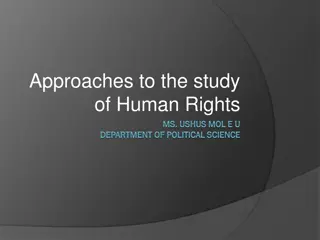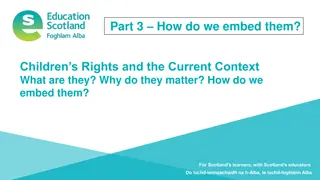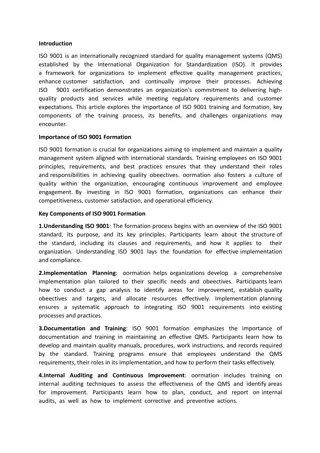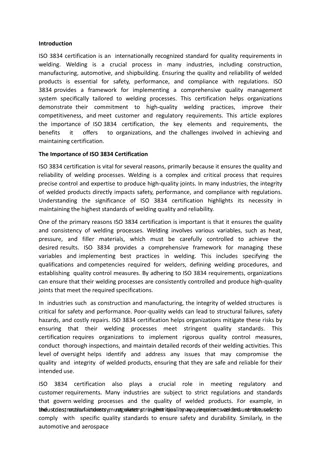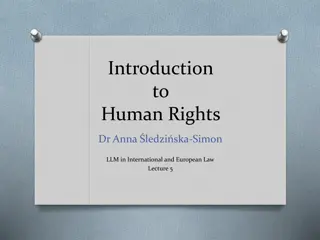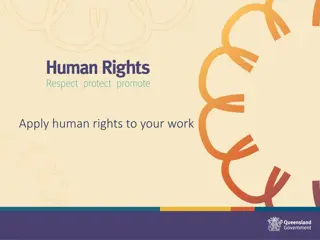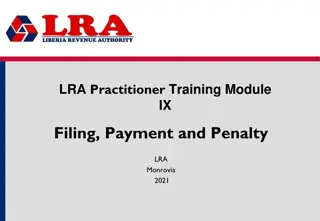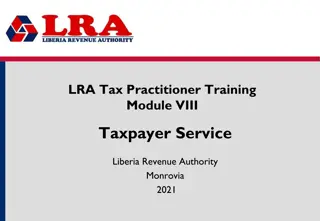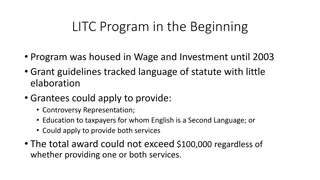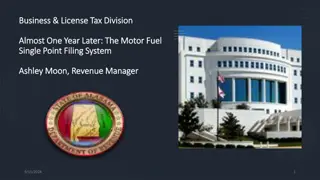
International Conference on Taxpayer Rights: A Human Rights Framework for Tax Collection Practices
The 7th International Conference on Taxpayer Rights focused on creating a framework that aligns taxpayer rights with human rights principles in post-COVID tax collection practices. Panelists discussed assessing taxpayers' ability to pay, statutory limitations on tax collection, judicial review, and more. The conference also highlighted cases involving tax collection challenges and enforcement issues, emphasizing the importance of balancing enforcement with protection of taxpayers' rights.
Download Presentation

Please find below an Image/Link to download the presentation.
The content on the website is provided AS IS for your information and personal use only. It may not be sold, licensed, or shared on other websites without obtaining consent from the author. If you encounter any issues during the download, it is possible that the publisher has removed the file from their server.
You are allowed to download the files provided on this website for personal or commercial use, subject to the condition that they are used lawfully. All files are the property of their respective owners.
The content on the website is provided AS IS for your information and personal use only. It may not be sold, licensed, or shared on other websites without obtaining consent from the author.
E N D
Presentation Transcript
7th International Conference on Taxpayer Rights Tax Collection & Taxpayer Rights in the Post-COVID World Panel I: A Taxpayer Rights/Human Rights Framework for Tax Collection Practices Panelists: Leslie Book, Villanova Law School, United States Jos Andr s Rozas, University of Barcelona, Spain Edson Uribe, Galicia Abogados, Mexico Chair: Lu s Eduardo Schoueri, University of S o Paulo, Brazil
Panel I: A Taxpayer Rights/Human Rights Framework for Tax Collection Practices Concrete assessment of taxpayer's ability to pay: Statutory periods of limitation for collecting taxes Availability of judicial review of agency collection actions Requirement of paying first before dispute resolution ( solve et repete ) Availability of damages for agency overreach Further topics (Leslie Book)
Concrete assessment of taxpayer's ability to pay
Concrete assessment of taxpayer's ability to pay Jos Andr s Rozas, University of Barcelona, Spain TAX COLLECTION CASES 1.-ECHR ART. 1, PROT. 1: PEACEFUL ENJOYMENT OF HIS POSSESSIONS NO ARBITRARY AND DISPROPORTINATE (IMPOSITION) AND ENFORCEMENT : ECHR, 17/01/2012 (14902/04) Yukos v. Russia: BAD FAITH; SHAM COMPANIES; TAX HEAVENS; FRAUDULENT TAX ARRANGEMENTS NECESSARY TO SECURE THE PAYMENT OF TAXES LACK OF FLEXIBILITY HAD A NEGATIVE OVERALL EFFECT ON THE CONDUCT OF THE ENFORCEMENT PROCEEDINGS AGAINST THE APPLICANT COMPANY (656): 7% ENFORCEMENT PROCEEDINGS FEE; DENIED DEFERRED PAYMENTS AND ALTERNATIVE GARANTEES; ASSETS SEIZED; SHARES SOLD; SPEED AUCTION (BANKRUPTCY) (5/2) 100% PENALTIES (4/3)
Concrete assessment of taxpayer's ability to pay Jos Andr s Rozas, University of Barcelona, Spain TAX COLLECTION CASES 1.-ECHR ART. 1, PROT. 1: PEACEFUL ENJOYMENT OF HIS POSSESSIONS ECHR (38785/18) Silvano Radobuljac v Croatia: OFFSETTING A TAX DEBT WITH A ENFORCEABLE CLAIM AGAINST THE STATE IT: ECJ, Case C-95-19, Agenzia delle Dogane v. Silcompa SpA: DOUBLE REQUESTING BY STATE OF DEPARTURE AND OF DESTINATION ECHR (48225/08) Beires C.rte-Real v. Portogal: INTERESTS FOR UNDUTY PAYMENTS IT: Case C-199/82 San Giorgio v Italy; ECHR (58364/10), Antonov v. Bulgaria: RIGHT TO REIMBURSMENT OF UNDUTY PAYMENTS ECHR (803/02), Intersplav v. Ukraine: TAX CREDIT FOR VAT; ECHR (3991/03), Bulves ad v. Bulgaria: NOT WITHOLDED AS A GARANTEE FOR LONG TIME ECHR (55887/07) Edata-Trans S.R.L. v. Moldavia: DENY VAT REFUND BECAUSE THE SUPPLIER HAS NOT PAYED THE TAX DEBT ECHR (27183/04) Rousk v. Sweeden: SEIZURE OF HOUSEHOLD FOR TAX DEBTS
Concrete assessment of taxpayer's ability to pay Jos Andr s Rozas, University of Barcelona, Spain TAXPAYERS COMMITTEE CONSEJO PARA LA DEFENSA DEL CONTRIBUYENTE (SPANISH TAXPAYERS OMBUDSMAN COMMITTEE) COMMITTEE (4/4/8): o SECOND STAGE OF THE CLAIMS (3%/10.000) o REPORTS, PROPOSALS: 215; 9/Y; 23% (51) o SEMMINARS STAFF OFFICES (25)(97%) o INTERNAL AUDIT SERVICES OF THE TAX AGENCY o THREE UNITS
Concrete assessment of taxpayer's ability to pay Jos Andr s Rozas, University of Barcelona, Spain TAXPAYERS COMMITTEE REPORTS, PROPOSALS: 215; 9/Y; 23% (51) SEIZURE OF MINIMUM NECESSARY FOR LIVING (R7/20; ATS 9295/2019) THIRD PARTIES AND DOUBLE PAYMENTS (P1/2003; P8/2003; P26/00; R2/12; R1/18) REFUND OF PAYMENTS AND GUARANTEES (P1/99; P16/99; P20/99; P29/99; P43/99; P50/99; P5/02; P1/08; R2/10) INTERESTS AND SUSPENSION OF PAYMENTS (P8/97; P2/99; P12/99; P18/99; P10/00; P2/02
Statutory Periods of Limitation For Collecting Taxes
Statutory Periods of Limitation For Collecting Taxes Leslie Book, Villanova Law School, United States PRESENT STATUS: There is a general 10-year period to collect taxes following assessment, subject to tolling for events that generally delay IRS ability to collect IRS records are often erroneous when computing SOL on collection, leading to inconsistent application of rules and inadequate information given to taxpayers. This confusion is often the result of inadequate records or information pertaining to actions that taxpayers may take that can toll the SOL on collections. IRS should in fact clearly and consistently note SOL on collections on taxpayer transcripts. See Fogg, Calculating the Collection Statute of Limitations, Procedurally Taxing (Jan. 29, 2021), https://procedurallytaxing.com/calculating-the-collection-statute-of-limitations/
Statutory Periods of Limitation For Collecting Taxes Jos Andr s Rozas, University of Barcelona, Spain PRESENT STATUS 4 YEARS (INTERRUPTION); 5/10 (TAX OFFENCE) LIABILITY CHANNEL (THIRD PARTIES); STS 673/2022 C-788/19 (ECLI:EU:C:2022:55) INFORMATION OVERSEAS ASSETS OR RIGHTS (FORM 720) STATUTE OF LIMITATION UNJUSTIFIED CAPITAL GAINS WITHOUT BENEFIF OF SOL EXTENDED LIMITATION PERIOD (X and Passenheim- van Schoot, C-155/08) TAX DEBT, INTERESTS AND PENALTIES: 100% LACK OF PROPORTIONALITY AND DISCRIMINATION ECHR (YUKOS; 574): NO REASONABLE INTERPRETATION OF STATUTE OF LIMITATION RULES (ART. 1.PR.1)
Statutory Periods of Limitation For Collecting Taxes Jos Andr s Rozas, University of Barcelona, Spain UE: DIR. 2001/44/CE, 2010/24/UE; EC Regulation (EU) 1189/2011 : NOTICES AND SEIZURE OF ASSETS AND RIGHTS: (MORE THAN 1.500 ; 5 YEARS) LIMITATIONS ON THE PRINCIPLE OF MUTUAL TRUST MUST BE INTERPRETED STRICTLY (IR: ECJ, C-34-17, Donnellan, 50) PRECAUTIONARY MEASURES: REASONS AND CIRCUMSTANCES (EE: C- 420/19, Maksu- ja Tolliamet v Heavyinstall O ) UNIFORM INSTRUMENT (APPLICANT STATE); NOT TO REVIEW ENFORCEABILITY (CZ: ECJ, 14 Jan. 2010, Case C-233/08, Milan Kyrian v. Celn ad T bor, 50) ENFORCEMENT MEASURES (REQUESTED STATE); OFFICIAL LANGUAGE (KYRIAN, 60) OECD/EC: MUTUAL ADMINISTRATIVE ASSISTANCE IN TAX MATTERS (2010) SPECIFIC CLAUSE IN DOUBLE TAXATION TREATIES TAX COORDINATION
Statutory Periods of Limitation For Collecting Taxes Edson Uribe, Galicia Abogados, Mexico Present status: In Mexico, there is a general term of 5 years to collect taxes from the time the tax obligation is legally enforceable. This period may be interrupted (not suspended) each time the Tax Administration decides to carry out collection actions. Unnecessary extension of the powers of the authorities, legal uncertainty and a significant increase in tax liability against taxpayers. Should be: Best practices on the due control of legally enforceable tax obligations. Good faith and better communication with taxpayers is needed. Necessary to understand this problem is not a issue of laws but of economic sense for both tax administration and taxpayers.
Availability of Judicial Review of Agency Collection Actions
Availability of Judicial Review of Agency Collection Actions Leslie Book, Villanova Law School, United States PRESENT STATUS: From a US perspective, this falls into two categories: 1) The ability to review affirmative agency collection/enforcement actions, and 2) The ability for a taxpayer to get court review for taxpayer s request to an alternative to enforced collection, such as installment agreements (payment plans), compromises or temporary stay on collection due to hardship COLLECTION DUE PROCESS: The right to additional notice, administrative hearing, and limited judicial review prior to administrative levy and subsequent to filing notice of federal tax lien Hearing allows taxpayer to raise relief from joint liability, appropriateness of IRS collection action, collection alternatives and in limited cases underlying liability Hearing before IRS Independent Office of Appeals, where there is requirement to verify IRS followed laws and policies, consider taxpayer issues that they raise and whether any proposed collection action balances the need for the efficient collection of taxes with the legitimate concern of the person that any collection action be no more intrusive than necessary.
Availability of Judicial Review of Agency Collection Actions (continued) Leslie Book, Villanova Law School, United States At times, IRS policies or practices minimize theoretical protections, such as a failure to publicize alternatives to enforced collections or the decision to effectively cut out judicial review of decisions to seize personal residences. IRS can minimize these harms, including through highlighting all collection alternatives and minimize formal powers that are inconsistent with legislative desire to highlight taxpayer protections. See Book, Partial Pay Installment Agreements in the Dark, Procedurally Taxing (April 5, 2022), https://procedurallytaxing.com/partial-pay-installment-agreements-in-the-dark/ See Book, Principal Residences as Collection Target: TIGTA Criticizes IRS Practice, Procedurally Taxing (April 11, 2022), https://procedurallytaxing.com/principal-residences-as-collection-target-tigta-criticizes-irs-practice/
Availability of Judicial Review of Agency Collection Actions Jos Andr s Rozas, University of Barcelona, Spain TAX JUSTICE STATUS DOUBLE JUDICIAL CHECK 1881/1973 1/3 YEARS RECURSO POTESTATIVO DE REPOSICI N TRIBUNALES ECON MICO ADMINISTRATIVO REGIONALES (1996/2003/2005) JUNTA DE TRIBUTS DE CATALUNYA (2017) TRIBUNAL ECON MICO ADMINISTRATIVO CENTRAL (1980) CONSELL TRIBUTARI (1988/2003) (AUDIENCIAS TERRITORIALES) TRIBUNALES SUPERIORES DE JUSTICIA 1/3 YEARS AUDIENCIA NACIONAL (1977) JUZGADOS CONTENCIOSO ADMINISTRATIVOS (1998) [TSJ] TRIBUNAL SUPREMO (2015) 16 CONSEJO DEFENSA DEL CONTRIBUYENTE (1997) JUNTAS ARBITRALES
Availability of Judicial Review of Agency Collection Actions Jos Andr s Rozas, University of Barcelona, Spain TAX JUSTICE BALANCE 150 DAYS ADMINISTRATIVE REVIEW, FILTER ( APPEAL OFFICES ) LOOKING FOR AN ARRANGEMENT/SETTLEMENT ENFORCEMENT OF THE PAYMENT NATIONAL TAX COURT REGIONAL TAX COURTS 1 / 2 Y E A R S REGIONAL COURTS OF APPEALS NATIONAL COURT OF APPEALS SUPREME COURT CONSEJO DEFENSA DEL CONTRIBUYENTE (1997) JUNTAS ARBITRALES
Availability of Judicial Review of Agency Collection Actions Edson Uribe, Galicia Abogados, Mexico Present status: Currently, taxpayers in Mexico can dispute tax collection acts through administrative or jurisdictional channels until the tax authorities publish the call for auction of the seized assets. Abuses by tax authorities (e.g., discretionally deciding to extend the seizure of assets without relying on an appraisal in order to pressure taxpayer to pay) Should be: Better practices are necessary on the development of the coercive tax procedure. Officials discretion to decide on certain acts of said procedure is very high. Tax officials' fear of being subject to internal affairs procedures makes the collection approach much more aggressive.
Requirement of Paying First Before Dispute Resolution ( solve et repete )
Requirement of Paying First Before Dispute Resolution ( solve et repete ) Leslie Book, Villanova Law School, United States PRESENT STATUS: General opportunity for taxes in US subject to deficiency procedures, such as income, estate and gift taxes There are many civil tax penalties in US that are subject to immediate assessment and collection without opportunity for court review. Inconsistent with taxpayer rights, including The Right to Pay No More than the Correct Amount of Tax The Right to Challenge the IRS s Position and Be Heard The Right to Appeal an IRS Decision in an Independent Forum The Right to a Fair and Just Tax System Proposals to reform refund procedures, expand deficiency procedures, or modify collection due process may ameliorate the concerns. See Book, Larson Part 2: Absence of Prepayment Judicial Review Is Not a Constitutional Defect, Procedurally Taxing (Mar. 10, 2018), https://procedurallytaxing.com/larson-part-2-absence-of- prepayment-judicial-review-does-is-not-a-constitutional-defect/
Requirement of Paying First Before Dispute Resolution ( solve et repete ) Edson Uribe, Galicia Abogados, Mexico Present status: In practice, even when taxpayers file means of defense in a timely manner, the tax authority illegally initiates collection actions. Even when the taxpayer, collaborates by informing the collecting authority about the filing of an appeal or administrative claim (internal legal department vs. administrative level). Should be: Best practices are needed on tax administration for a better internal communication between collection and legal departments. It is vital that the tax authorities are sensitive to the impact that collection acts have on taxpayers (economic sphere and reputational level) Experience as former Deputy Chair of PRODECON (naming and shaming)
Availability of Damages For Agency Overreach
Availability of Damages For Agency Overreach Leslie Book, Villanova Law School, United States The Internal Revenue Code allows taxpayers to seek damages for agency misconduct pertaining to the failure to release a lien or in connection with a collection action if an IRS employee intentionally, recklessly or negligently disregards the statute or regulations. Courts have very narrowly defined collection action for these purposes, effectively insulating agency misconduct in connection with administrative reviews of IRS collection action. See Book, Sixth Circuit Holds Potential Misconduct in CDP Hearing Does Not Give Rise to Wrongful Collection Action, Procedurally Taxing (March 3, 2017), https://procedurallytaxing.com/sixth-circuit-holds- potential-misconduct-in-cdp-hearing-does-not-give-rise-to-wrongful-collection-action/
Availability of Damages For Agency Overreach Jos Andr s Rozas, University of Barcelona, Spain CLAIR LANGUAGE TAX COLLECTION NOTICES (LINGUISTIC) CERTAINTY ACCESIBILITY AND FORESEEABILITY (ECHR) CORPUS OF NOTICES (SEIZURE) ADI PUBLIC IMAGE OF TAX ADMINISTRATION (POLITICAL SCIENCES) NAMING AND SHAMING NEWSLETTER AND BLOG STRATEGIES FOR TAX SIMPLIFICATION (TAX LAW) NUDGE LETTERS APP (DEFERRAL AND INSTALMENTS) ARRANGEMENTS AND VOLUNTARY DISCLOSURE BEHAVIORAL INSIGHTS
Further topics: IRS Power To Seize Refunds Leslie Book, Villanova Law School, United States OFFSET POWERS IRS has discretion to offset refunds against past due federal taxes and is statutorily required to apply claimed refunds against other federal and state debts, like state tax liabilities, past due child support, and delinquent student loans COVID RELIEF Statutory relief: Congress restricted IRS ability to offset COVID relief administered through the tax law, with limited exception for child support ADMINISTRATIVE RELIEF Pause in collection activity, such as levies and filing notices of federal tax lien Restrict IRS from applying refunds to delinquent tax debts that are subject to a settlement, called an offer in compromise (OIC) Not applying current year refunds to the agreed-upon tax liability For hardship situations the offset bypass refund remedy is now available during the pendency of an OIC
Further topics: Restriction on Right to Travel Due To Serious Tax Delinquency Leslie Book, Villanova Law School, United States As a result of 2015 legislation, the IRS, working with US State Department, can deny, revoke or limit the US passport of an individual with seriously delinquent tax debts (SDTD) SDTD: Tax liability greater than $50,000 (includes assessed interest and penalties), with IRS having either levied or filed a notice of federal tax lien and individual has exercised CDP rights, or allowed them to lapse Statutory Exclusions: If taxpayer is paying pursuant to installment agreement, compromise, or seeking relief from joint and several liability Discretionary Exclusions: taxpayer demonstrating financial hardship; debts part of pending collection alternative SDTD status not permanent: for example if fully paid, or taxpayer is paying pursuant to payment plan or compromise
Further topics: Restriction on Right to Travel Due To Serious Tax Delinquency (continued) Leslie Book, Villanova Law School, United States Limited judicial review to consider whether certification erroneous or IRS has failed to decertify No right to administrative review; only Tax Court or federal district court Limited judicial review not to include underlying liability but only whether taxpayer meets a statutory or discretionary exclusion, and only on an abuse of discretion standard and on basis of computerized review of taxpayer records To date, this has survived constitutional challenge based onclaims that the provision denies fundamental right to travel embedded in Fifth Amendment of constitution or human rights under the Universal Declaration of Human Rights. Maehr v. United States Department of State, (10th Cir. 2021) and Rowen v Comm r, 156 TC No. 8 (2021).


